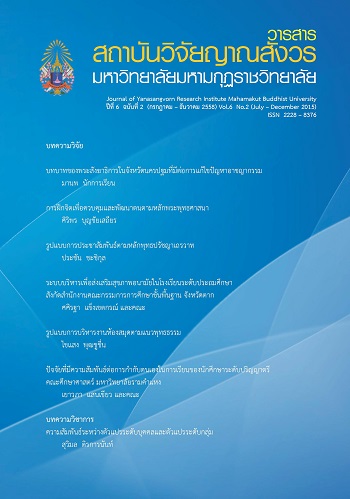MENTAL TRAINING FOR CONTROLLING AND DEVELOPING ONE SELF IN BUDDHISM
Main Article Content
Abstract
The objectives of this thesis were to study mind, mental training and the principles of self control and development according to Buddhism, to integrate the mental training for self control and development in living a life, and to propose the model for integrating the mental training for self control and development in living a life. The results of this research study were found that there are two main types of the mental trainings : tranquility development which calms the mind and insight development which leads to wisdom. Mind has influence on thought, speech and body, resulting to one’s good or bad actions. So, properly mental training could create happiness and prosperity to oneself. Frequent and continuous mental training from tranquility development to insight development could lead to self control and development with mindfulness, concentration and wisdom. In Buddhism, the main point of self control is to hold back or stop oneself from doing evils or wrong things, and the important point of self development is to obtain the realization and see things as they really are. Therefore, self control and development are doing good things and realizing actual happenings. The result of the research study can be synthesized by integrating the mental training for self control and development consisting of outer factors; physical and social dimensions, and inner factors; mental and wisdom dimensions. Mental training causes mental knowledge procedure and it can be applied in living a life. The body of knowledge obtained from the study is the knowing process of mind in controlling and developing oneself. The integrated model can be presented with RCK Model comprising of: (1) Realizing Defilements and Ignorance, (2) Concentrating on Stopping Defilements and Ignorance, and (3) Knowing the Actual Happenings Apparently.
Article Details
References
พระพุทธโฆสเถระ. คัมภีร์วิสุทธิมรรค แปลโดย สมเด็จพระพุฒาจารย์ (อาจ อาสภมหาเถร) พิมพ์ครั้งที่ ๖. กรุงเทพมหานคร : บริษัท ธนาเพรส จำกัด, 2548.
บุญมี เมธางกูร และ วรรณสิทธิ์ ไวทยะเสรี. คู่มือการศึกษาพระอภิธรรมมัตถสังคหะปริจเฉทที่ ๑. กรุงเทพมหานคร : โรงพิมพ์สุทธิสารการพิมพ์, 2532.
ปิ่น มุทุกันต์ พ.อ. ปาฐกถาเรื่อง จิต. กรุงเทพมหานคร : โรงพิมพ์มหามกุฏราชวิทยาลัย, 2515.


